By Okey IBEKE
On Wednesday, April 9, 2025, the Chairman, House of Representatives Committee on Customs and Excise, Hon. Leke Abejide, led his committee to the Apapa Area Command of the Nigeria Customs Service on an oversight visit. While addressing the officers, he hinted that the House was planning an amendment of the Nigeria Customs Service Act 2023 in order to ensure a four-year statutory tenure for the Comptroller-General of Customs (CGC).
Hon. Abejide said the tenure of the CGC would have been stipulated in the law when it was promulgated, but for the legal adviser of the House who opposed it on the grounds that the civil service rule supersedes it.
Alluding to how such an amendment has been working in the Nigeria Police Force, he regretted that the House could not do the right thing when the occasion presented itself because of the legal adviser’s advice. He gave the assurance that the House is ready to implement the amendment now.
As a matter of fact, the House Committee deserves commendation for this introspection and recognition of the disadvantage of keeping the tenure of CGC tied to the Civil Service rules. The House deserves commendation for promptly recognizing the damage this omission will cause for the Service now and in the future as well as the economy of the nation, should the Act and the government continue to remain silent on CGC’s tenure.
It should be noted that President Tinubu inherited a totally dysfunctional Nigeria Customs Service that was for eight years headed by a retired army colonel, Hameed Ali. Ali was drafted out of retirement by former President Muhamadu Buhari, after more than 16 years in retirement, to head a highly technical organization like Customs.
The eight years the retired army colonel held sway in Customs took heavy toll on the technical skills, managerial and operational capabilities of the Customs. The Service became militarized as a serving army officer, one Colonel Buhari, brought to the Service as Principal Staff Officer by Ali, took over headship and control of key operations.
So, when President Bola Ahmed Tinubu came on board, the Nigeria Customs Service was in dire need of a competent leader, a true professional to effectively drive and lead changes that would make immediate impact on the execution of the President’s economic policies.
President Tinubu found such a personality in Bashiru Wale Adeniyi MFR, then a Deputy Comptroller-General, a thoroughbred, highly cerebral Customs officer, whom he appointed the Comptroller General of the Service, on June 19, 2023.
Adeniyi, at the time of his appointment, had over 30 years-experience in Customs administration, especially in the areas of strategic and operational responsibilities. Apart from possessing a deep understanding of the complex and constantly evolving international trade landscape, Adeniyi among many other competencies, has a strong command of Customs regulations, laws, and procedures as well as the ability to navigate and adapt to changing policies and international trade complexities. These are the qualities needed for effective management of a modern Customs service.
Before his appointment, Wale Adeniyi had coordinated engagements with International Organizations including: World Customs Organization (WCO), World Trade Organization (WTO), United Nations Conference on Trade and Development (UNCTAD), United Nations Office on Drugs and Crime (UNODC), World Bank (WB), International Monetary Fund (IMF).
The Role of Nigeria Customs Service in the Nation’s Economy
It is noteworthy that the role of Nigeria Customs Service has expanded from its core statutory mandate in keeping with the evolving national economic demands, changing fiscal policies and developments in global trade.
Apart from discharging its core function of revenue collection, anti-smuggling and trade facilitation, Customs now plays a crucial role in the collection of statistics, which are essential for balance of payments and the formulation of fiscal and trade policies. It also ensures compliance with safety and security standards and contribute to the fight against terrorism and money laundering.
The agency’s task also includes correct application of tariffs to the benefit and protection of local industry, ensuring that incentives aimed at attracting investment and building local capacity and providing employment are not abused, thus contributing to economic development.
The Service is also the primary enforcer of the country’s trade policies, quota restrictions, anti-dumping measures, trade embargoes, intellectual property rights, environmental and wildlife conservation laws.
In the light of all these, it becomes manifestly clear that realization of President Bola Ahmed Tinubu’s reform policies, largely depends, apart from other organizations, on a knowledgeable, skilled, resourceful, innovative and effective Customs Service. The present customs administration led by Adewale Adeniyi, it must be observed, embodies these qualities.
Adeniyi’s Strategic Agenda, Policy Measures, Activities and Achievements
On assumption of office, Adeniyi, in line with the President’s reform agenda and with the understanding of the country’s precarious economic situation, saw the need to initiate a transformation that was both courageous and result oriented.
He, thus, hinged his policy direction and action plans on an agenda of “Collaboration, Consolidation and Innovative Solutions”. The agenda according to him, was born out of the need to:
*Adopt modern customs governance, strategic orientation, transparency and accountability.
*Groom qualified human resources and embracing an integrity, knowledge and merit based promotions, staff deployment and management framework.
*Foster a competitive domestic economy through fair revenue collection and risk-based border controls.
*Adopt user-friendly procedures and collaboration with other agencies and stakeholders based on the four pillars of trade facilitation: transparency, simplification, harmonization and standardization.
*Identify current challenges and risks posed by emerging complexities in international trade and optimize the use of data and integrated risk management to mitigate threats and facilitate trade.
*Explore opportunities that abound in Information and Communication Technologies, and applications of other modern advanced technologies for data analytics and artificial intelligence.
These needs were patterned along the three pillars of the World Customs Organization’s SAFE Frameworks of Standards, which are: Customs-to-Customs network arrangements, Customs-to-Business partnerships, and Customs-to-other government agencies cooperation.
In demonstration of his expertise in addressing the identified needs, Adeniyi immediately introduced series of short and long term measures, which were aimed at plugging revenue leakages, securing of the borders, streamlining the customs clearance process and addressing the eight years dysfunctional system that had existed in the Service. Some of the measures, include:
-The immediate setting up of a Revenue Review Performance Recovery Team.
-Dissolution of existing Strike Force Teams –a military legacy –that constituted the multiple layers of enforcement.
This was done to dismantle the multiple checkpoints that had been constituting barriers to legitimate trades.
-The introduction of the Advanced Ruling system which represents a notable stride targeted at aligning Customs operations with global best practices, in line with recommendations of the WTO TFA (World Trade Organization Trade Facilitation Agreement).
-The inauguration of a Steering Committee on the Implementation of the Authorized Economic Operators for Compliant Traders, with a clear focus on transitioning from the existing Fastrack 2.0 to the Authorized Economic Operator (AEO)concept.
-Interactions with the international community – WCO, JICA, Japan Customs among others on the implementation of the Customs Laboratory, adoption of geospatial, conduct of a Time Release Study to mention a few.
-Engagements with the Customs Administration of the Republic of Benin to address the existing gaps that sustains the activities of smugglers and revenue leakage.
-The constitution of a new management team, appointed strictly based on merit, upholding the principle of equitable geopolitical representation.
-A strategic deployment of Customs Area Controllers and other strategic units, also rooted in merit and in adherence to the principle of equity.
-The initiation of the development of a Corporate Social Responsibility Strategy for the Nigeria Customs Service, harmonized with the goal of contributing to the government’s development agenda.
-Finalizing arrangements with the Federal Road Safety Corps (FRSC) to integrate operational systems and eradicate registration of smuggled vehicles.
-Engagement with several stakeholders including government agencies, non-governmental agencies and the private sector.
The effects of bold, diligent and effective implementation of these initiatives were felt immediately, not only in the ease of doing business, but mostly on revenue generation and quantity of seizures recorded by the Service in 2023.
That year, a remarkable amount of N3.2 trillion was collected into the Federation Account by the Service, representing 21.4 per cent increase compared to N2.64 trillion recorded in the preceding year, 2022.
This impressive revenue performance came in the midst of anxiety and CBN’s currency redesign policy associated with 2023 election.
The Service would have collected about N5.2 trillion, if N2 trillion was not lost to waivers and concessions granted investors by the government.
Notably, about sixty nine per cent of achievements for that year were made in the second half of the year –the period Adeniyi took charge of the Service.
The meteoric rise in performance of the Service continued as it generated a total sum of N6.105 trillion in 2024, surpassing the target of N5.079 trillion by N1.026 trillion, representing a 20.2% increase above the target given by the government. This is apart from about N1.2 trillion lost to local manufacturers in industrial incentives, through import duty waivers and concessions.
In pursuit of balancing revenue collection with trade facilitation, the Service did not lose focus on the need to protect Nigerians from the entry of harmful substances, import/export of restricted and prohibited goods.
It made 3,555 seizures with a Duty Paid Value (DPV) of N35.29 billion in 2024. These seizures, with a Cost, Insurance, and Freight (CIF) value of ₦28.46 billion and total duty of ₦6.83 billion, highlights the scale of attempted economic sabotage prevented by the Service.
The seizures of arms and ammunition, including 900 arms and 113,472 rounds of ammunition and the interception of narcotics and other illicit drugs, resulting in 105 seizures across various forms, was aided by the declaration of a state of emergency at our major entry points.
The Service also intercepted unauthorized pharmaceutical products, with 40 seizures including 175,676 pieces and 6,271 cartons of various medicaments valued at ₦3.04 billion, protecting public health from potentially dangerous counterfeit drugs.
The Service’s enforcement activities also revealed evolving patterns in environmental and wildlife crimes, with 76 seizures of animal/wildlife products valued at ₦5.93 billion.
The Service has predictably maintained its performance trajectory as it has recorded a revenue collection of N1.751 trillion in the first quarter of this year, 2025. This revenue is about N106.5 billion above the quarterly target.
The Service also maintained robust anti-smuggling operations during the quarter, recording 298 seizures with a total Duty Paid Value (DPV) of ₦7,698,557,347.67. This represents a significant 78.41% increase compared to the ₦4,315,162,568.35 recorded in Q4 2024, demonstrating heightened operational effectiveness.
These seizures include rice, used tires, pharmaceuticals, wildlife products, pirated intellectual properties, petroleum products and textiles, etc.
With these remarkable achievements, there is no gainsaying that the Service, under the leadership of the Comptroller-General, Bashiru Adewale Adeniyi has been playing a critical role in making the Renewed Hope Agenda of the President a reality.
This much has been acknowledged by the President himself, Nigeria Customs Board, policy makers, organized private sector, local and international organizations.
Adeniyi has also garnered multiple commendations, honours and awards from diverse organizations.
Challenges
Apart from the persistent, age-long issue of smuggling; breach of fiscal policies by importers and their agents; abuse of government industrial incentives; some activities of other government agencies, shipping companies, terminal operators, maritime workers unions, state and local governments operatives and touts operating along ports access roads and transport unions; other challenges that pose a threat to the continued good performance of the Service, are impending knowledge/leadership gaps facing it and the failure of the NCS Act, 2023 to specify the tenure of Comptroller-General.
The Impending Knowledge/Leadership Gaps
The very impressive achievements by the Nigeria Customs Service under the present Customs management may not be sustained, unless a strong decision is taken to avert the impending knowledge and skill gaps facing the Service.
At the moment, there are no less than 791 senior officers of the Service, including three Deputy Comptrollers General (DCGs), seven Assistant Comptrollers General (ACGs), and 45 full Comptrollers of Customs that are to be statutorily discharged between January and September next year.
In accordance with the Public Service Rule (PSR) No. 100238 and Federal Government circular No. 100238, and Federal government circular 63216/S.1/x/T; CR1/2001/5 of 20/03/2001, all affected officers due for retirement in 2026 are to disengage from active service and proceed on three months pre-retirement leave, three months prior to the effective date of retirement.
This is apart from the same numbers of officers retiring this year, 2025.
This development will, no doubt, create a yawning gap in human capacity at the highly strategic agency.
The harm that will follow this retirement gale will be better imagined than experienced.
The National Public Relations Officer of the Service, Assistant Comptroller Abdullahi Maiwada, though said that there is no need to panic as the current recruitment exercise and accelerated promotion examination in the month of May this year will fill the vacant positions.
He noted that the agency’s current policy on promotion is strategic, explaining that retirements and filling of vacancies will be seamless.
No doubt, the Comptroller-General may have designed strategies to redress and adhere strictly to this policy through the sustained yearly promotion exercise. But this cannot adequately address the situation.
It must be realized that there was no new recruitment into Customs for over 13 years.
The crop of officers who are in line for taking over the managerial, administrative and operational leadership, were enlisted in the service in 2009 and effectively started performing Customs duties in 2010, after six months of training.
This means that officers receiving accelerated promotions to fill top positions in the management cadre, have not stayed long enough in the service to garner the requisite experience to fill the vacant positions that will be created by the gales of retirements.
Accelerated promotion does not translate to accelerated knowledge and experience.
If the present crop of top officers leave, there will certainly be yawning skill, managerial, knowledge and leadership gaps that will impact negatively on the Service and its performance, especially with regards to implementation of most government’s fiscal policies.
The Imperative for Amendment of NCS ACT, 2023 and CGC’s Tenure Extension
Following the Civil Service Rules, Adeniyi would have left the Service at the end of this year, with its obvious consequences.
More importantly, the programmes he initiated and the efficiency that the Service has attained under his leadership must be sustained in view of what is currently going on in the global economy. With crude prices plummeting, and with obvious consequences on the country’s finances, revenue from Customs will be needed to cushion the effects of the oil revenue shortfall.
Considering the giant leap in Customs revenue under Wale Adeniyi, the nation expects greater performance, not a sudden dip; hence the issue of tenure for the CGC must be settled for the good of the economy.
Every Nigerian knows that for any chief executive officer in any government organization to make the expected impact, he needs at least four years in the position.
So, tying an organization like the Customs Service to the Civil Service with its bureaucracies and limitations is a hindrance to the efficient running of the Service.
Telling a newly-appointed and performing CGC to go because he has served for 35 years or has reached the retirement age of 60 is a setback to the Service and quite detrimental to the economic well-being of the nation.
This has been a source of immense concern to stakeholders and informed observers.
Thus the decision of the House of Representatives Committee to bring up the issue of CGC’s tenure at this time is quite auspicious.
Not effecting amendment in the Customs Act, and extending the working time of the present CGC means that all the giant strides he has made in driving the economic agenda of government, may not be sustained.
Hence, the need to avert the impending crisis, and to address the over 13 years of non- recruitment in the Service and eight years deficit of Colonel Hameed Ali’s management.
Since the House has given the clue, the President needs to consider initiating a process of amendment of the Nigeria Customs Service Act, 2023 to address the tenure issue.
The exigency of time and the peculiar situation in the agency demands that Adeniyi be allowed more time to complete the innovative tasks he has started, of which, most of are still in incubation periods.
Since the President had before now in anticipation of the impending leadership gap, graciously extended the services of about six management cadre of the agency, Adeniyi’s tenure should also be extended.
This is to give him enough time for the logical execution of several of his programmes, and to ensure adequate training and orientation of the young officers in preparation for their taking over the mantle of leadership.
Retaining the CGC for additional period of time, will enable for proper training and mentoring of those that will take over reigns of leadership.
This will also ensure that there will be little or no skill or knowledge gap by the time the CGC and those retained officers leave the Service as well as avert the challenges the situation poses to the President’s efforts at moving the country’s economy forward.
Okey IBEKE is the Principal Consultant, International Trade Advisory Services Ltd/Publisher, Business and Maritime West Africa
Like this:
Like Loading...


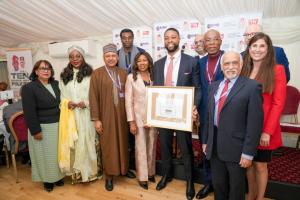



 Headlines2 months ago
Headlines2 months ago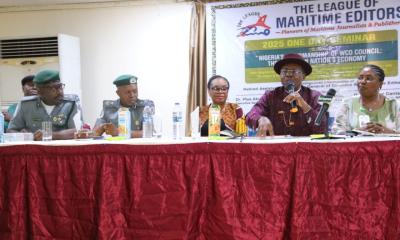
 Customs3 months ago
Customs3 months ago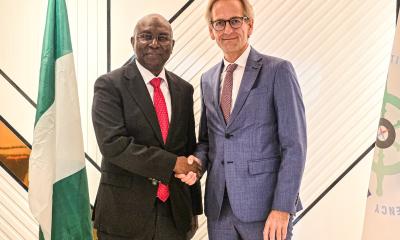
 Headlines2 months ago
Headlines2 months ago
 Headlines4 weeks ago
Headlines4 weeks ago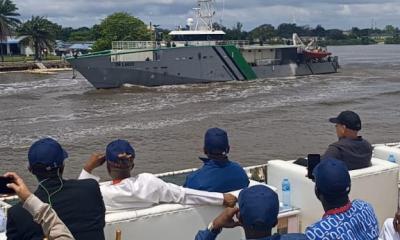
 Headlines3 months ago
Headlines3 months ago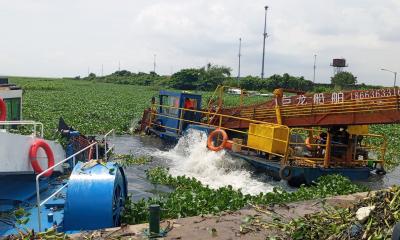
 Headlines2 months ago
Headlines2 months ago
